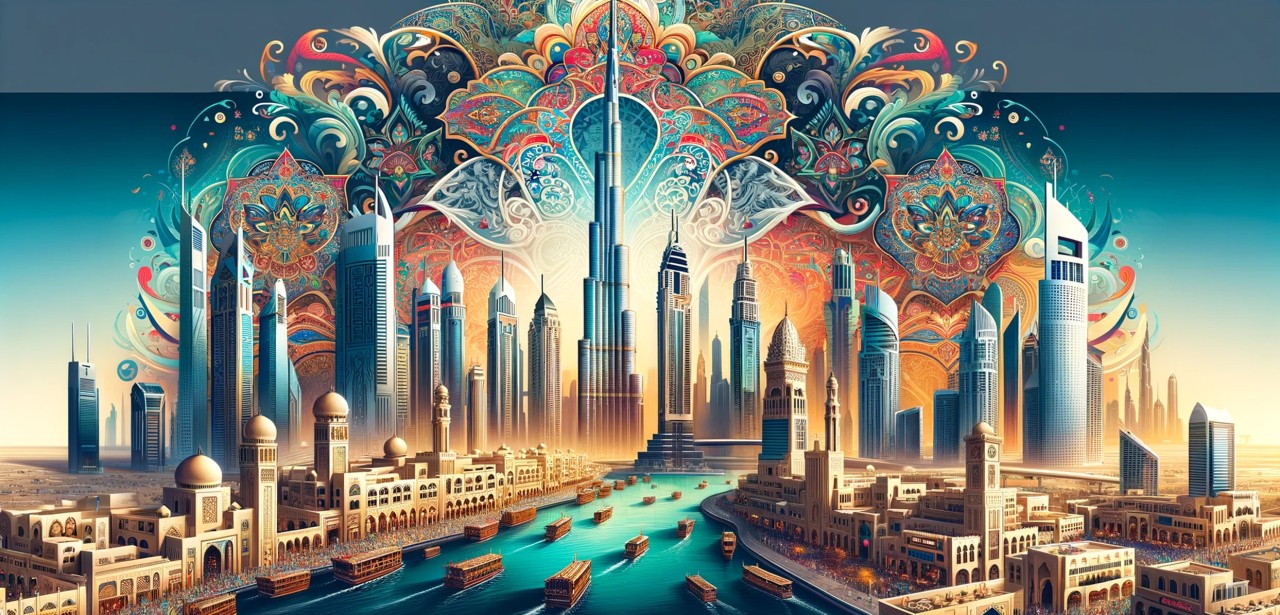

Category: Lifestyle in UAE, Posted at Oct. 23, 2024,
Dubai has gained global recognition for its breathtaking contemporary architecture, most notably the Burj Khalifa, the tallest building in the world. The city boasts an impressive skyline filled with luxurious hotels, office spaces, and residential towers.
Beyond its architectural marvels, Dubai is a hub of extravagant lifestyles, featuring vibrant nightlife, high-end shopping malls, and some of the most expensive cars and luxury goods. While the city is a playground for the affluent, its growing expat community allows newcomers to experience a modern urban lifestyle that appeals to all.
Historically, Dubai's rich Arab Islamic culture is intertwined with its dramatic desert landscape and extreme climate, characterized by vast sand dunes and diverse flora and fauna.
With a population nearing 3.5 million, Dubai has the largest expat community among the seven Emirates, with expats comprising approximately 88% of the population. The table below highlights the primary nationalities represented in Dubai:
CountryPercentage of Population: India 27.49% Pakistan 12.69% Bangladesh 7.40% Philippines 5.56% Iran 4.76% Egypt 4.23% Nepal 3.17%Sri Lanka 3.17% China 2.11% Other 17.94%
Dubai's culture is deeply influenced by its Islamic heritage and traditional Arab customs, evident in its architecture, music, clothing, cuisine, and lifestyle. The city serves as a cultural crossroads, blending modernity with rich history. Expats can explore the desert, sail on ancient dhows, and enjoy traditional cuisine, all while experiencing Dubai's contemporary nightlife.
1. Cultural Norms: While Dubai has a westernized appearance, it remains a Muslim city. Expats should be aware of cultural differences regarding drugs, alcohol, and public behavior.
2. Alcohol Regulations: Alcohol is served in hotels and licensed venues, but purchasing it outside these areas is restricted. Many residents opt for duty-free purchases.
3. Dress Code: Modesty is key in Dubai's dress code. Women should wear knee-length clothing that covers shoulders and midriffs, while men can wear shorts that cover the knee.
4. Ramadan Observances: During Ramadan, eating and drinking in public during daylight hours is prohibited for everyone, including non-Muslims.
5. LGBTQ+ Laws: Homosexuality remains illegal in the UAE. While Dubai is relatively tolerant, discretion is advised.
6. Living Arrangements: Unmarried couples should know that cohabitation is technically illegal. Public displays of affection may lead to fines or arrests.
7. Pet Ownership: Owning a dog is permitted, but strict regulations apply. Pets must be licensed, microchipped, and vaccinated.
8. Photography Restrictions: Be cautious when taking photos, especially of government buildings and military installations.
9. Business Etiquette: Small talk is valued in business settings. A bilingual business card is appreciated, and gender equality is emphasized in the workplace.
10. Language Considerations: While many locals speak English, learning basic Arabic phrases can enhance communication and show respect.
11. Safety and Security: Dubai is considered very safe, with a strict legal system and extensive surveillance.
12. Women's Rights: The UAE is making strides toward gender equality, with initiatives like women-only spaces and special promotions.
Dubai offers a high standard of healthcare. While Emirati citizens benefit from free services, expats must obtain health cards for public services, and private medical insurance is mandatory. Employers are typically required to provide health insurance coverage.
Moving to Dubai presents exciting opportunities, and understanding its culture will help you embrace your new life as an expat. Whether you're drawn by its luxurious lifestyle or the chance to experience a unique blend of tradition and modernity, Dubai is a city that promises an unforgettable experience.
and receive latest news and events in inbox